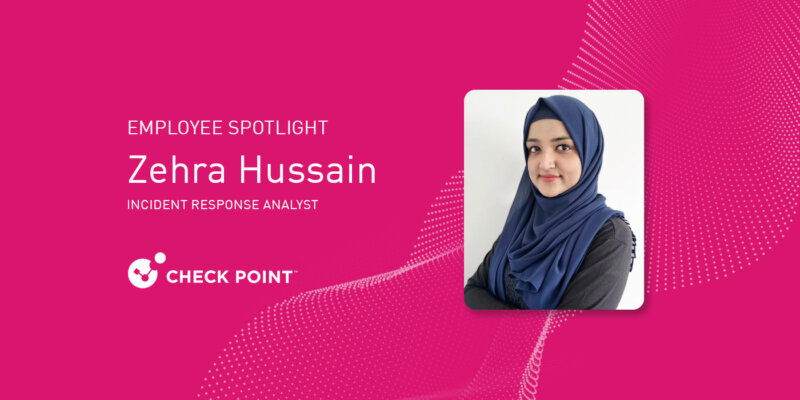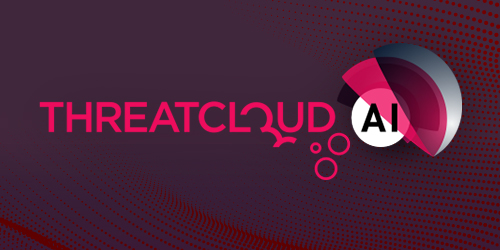
Getting to Know Zehra Hussain
Zehra Hussain is an Incident Response Analyst based in Sydney, Australia. Her role involves responding to security incidents and ensuring the protection of sensitive data and systems. With a background in digital forensics and satellite engineering, Zehra brings unique expertise to her role at Check Point.
Can you walk us through a typical day in your role/department?
Since my job as an incident response analyst is remote, I wake up a bit before my duty time, grab my cup of coffee, make my toast, and get to my desk to respond to e-mails and messages.
Our global incident response team operates on a global scale, spanning APAC, EMEA, and the Americas. We function as a 24/7 follow-the-sun team, meaning that there’s always an analyst available to respond to incidents, regardless of the time zone. Each day, analysts from different regions undertake a 9-to-5 shift and remain on-call from Monday to Sunday. This structure ensures that we can swiftly respond to any incident, no matter where it occurs.
As part of the APAC team, my workday begins ahead of most other regions. In the morning, I receive the handover from the Americas team, who are wrapping up their workday. The handover lets me know if there is anything to be done during my shift from active cases. Sipping up on my coffee, I work on the tasks to be done and attend the daily standup meeting with my APAC team, where we discuss cases, projects, and collaborative ideas. I then take a quick break for lunch and resume my tasks before passing the baton to the EMEA team.
What does incident response mean to you?
To me, incident response is about helping organizations handle cyberattacks efficiently, with the twin goals of minimizing business impact and reducing future risks. This includes both a proactive approach focused on strengthening security controls, and a reactive approach aimed at responding to incidents after they’ve taken place.
What part of your role is most rewarding to you?
As an incident responder at Check Point, I find it very gratifying to help organizations either prepare for an attack or contain any cyberattack as soon as possible. The fact that SMEs lose thousands of dollars and MNCs lose millions of dollars in breaches and attacks every year is alarming. If we could play even a tiny role in helping businesses mitigate their financial losses,that would be the most rewarding.
What is something about incident response that you wish more people knew?
There is no one formula to secure it all! New cyber threats emerge as quickly as technology evolves. It’s important to regularly assess your security posture and controls if you want to keep your environment safe. I’ve seen people performing security audits and assessments once in a blue moon, thinking their entire infrastructure is fortified for many years to come.
The adage “You’re only as strong as your weakest link” applies heavily in incident response. Regardless of how robust your system may be, a single, vulnerable point – often an unsuspecting employee – can be exploited with a phishing link or through social engineering. In the blink of an eye, hackers can gain initial access, and an entire system can be encrypted within hours. That’s why it’s so important for organizations to invest in security awareness training and user education.
What do you do for fun outside of work?
While I’d love to share a more fun response, I find simple joys in being a couch potato and watching an interesting movie or TV series. On occasion, I experiment with cooking for the family. Weekends are reserved for going out to our favorite spots with friends and family, and as we approach summer in Australia, I’m eagerly anticipating some beach therapy.
If you weren’t an incident response analyst, what would you be doing?
That’s a good question, as I’ve always found myself content doing digital forensics and incident response. If I weren’t working in cybersecurity, I would do something cool related to space science. I’ve worked as a satellite engineer for a renowned news channel, and if I had the opportunity, I think I’d enjoy working at a space agency doing satellite communications.
For the fourth year in a row, Forbes recognized Check Point as the World’s Best Cybersecurity Employer. To learn more about working at Check Point, visit our Careers page.









